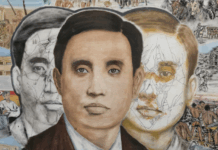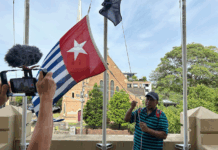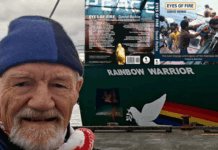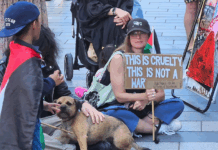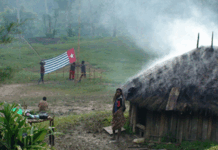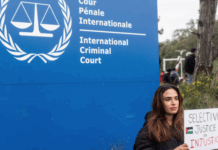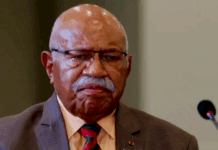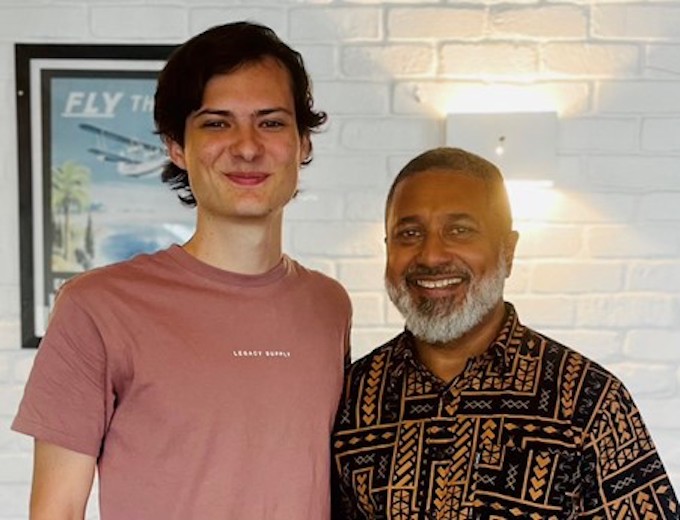
By Maxim Bock, Queensland University of Technology
Fiji journalist Felix Chaudhary recalls how the harassment began: “Initially, I was verbally warned to stop.”
“And not only warned but threatened as well. I think I was a bit ‘gung-ho’ at the time and I kind of took it lightly until the day I was taken to a particular site and beaten up.
“I was told that my mother would identify me at a mortuary. That’s when I knew that this was now serious, and that I couldn’t be so blasé and think that I’m immune.”
Pressing risks of Chaudhary’s early career
Felix Chaudhary, now director of news, current affairs and sports at Fiji TV, and former deputy chief-of-staff at The Fiji Times, was detained and threatened several times during the period of government led by former Prime Minister Voreqe Bainimarama from 2007 to 2022.
Commodore Bainimarama, as he was known at the time, executed his military coup in December 2006 against Prime Minister Laisenia Qarase and President Josefa IIoilo.
Although some media outlets were perceived as openly supporting the government then, not all relinquished their impartiality, Chaudhary explains.
“Some media organisations decided to follow suit. The one that I worked for, The Fiji Times, committed to remaining an objective and ethical media organisation.
“Everyone who worked there knew that at some point they would face challenges.”
Military impact on sugar industry
During the early days of the coup, Chaudhary was based in Viti Levu’s Western Division in the city of Lautoka, reporting about the impact of the military takeover of the sugar cane industry. It was there that he experienced some of his most severe harassment.
“It was just unfortunate that during the takeover, I was one of the first to face the challenges, simply because I was writing stories about how the sugar cane industry was being affected,” he says.
“I was reporting about how the military takeover was affecting the livelihoods of the people who depend on this industry. There are a lot of people who depend on sugar cane farming, and not necessarily just the farmers.
“I was writing from their perspective.”
A lot of countries, including Australia, in an effort to avoid appearing sympathetic to a government ruling through military dictatorship, turned their backs on Fiji, Chaudhary explains.
“These countries took a stand, and we respect them for that,” he says.
“However, a lot of aid that used to come in started to slow down, and assistance to the sugar industry, from the European Union, didn’t come through.
“The industry was struggling. But the Fijian government tried to maintain that everything was fine as they were in control.
‘Just not sustainable’
“It was just not sustainable. They didn’t have the resources to do it, and people were feeling the impact. This was around 2009. The military had been in power since 2006.”
Chaudhary chose to focus his writing on the difficulties faced by the locals: a view that was in direct contention with the military’s agenda.
He experienced a series of threats, including assurances of death if he continued to report on the takeover. His first encounter with the military saw him seized, driven to an unknown location, and physically assaulted.
Chaudhary soon realised this was not an isolated case and the threats on his life were far from empty.
“Other people, in addition to journalists, were taken into custody for many reasons. Some ended up dead after being beaten up. That’s when I knew that could happen to me,” he says.
“I figured I’d just continue to try and be as safe as possible.”
Chaudhary was later again abducted, threatened, and locked in a cell. No reason was given, no charges were laid, and he was repeatedly told that he might never leave.
Aware of military tactics
Having served in the Fiji military in 1987–1988, Chaudhary was aware of common military tactics, and knew what these personnel were capable of. Former army colleagues had also tried to warn him of the danger he was in.
“When I was taken in by the military, I was visited by two of my former colleagues. They told me if I didn’t stop, something was going to happen,” he says.
“That set the tone. It reminded me that I needed to be more careful.”
On another occasion, military personnel entered The Fiji Times offices and proceeded to forcefully arrest both Chaudhary, and his wife, the newspaper’s current chief-of-staff, Margaret Wise.
“The military entered the newsroom while we were both at work, demanded our phones and attacked [Margaret] physically. I came to her defence, and I was also attacked. These threats were not only to me, but to her as well.”
Chaudhary admires Margaret Wise’s incredible tenacity.
“She’s a very strong woman. Any other person might have wanted to run away from it all, but we both knew we had a responsibility to be the voice for those that didn’t have one,” he says.
Dictatorships have a ‘limited lifespan’
“She also knew that governments come and go, and that dictatorships only have a limited lifespan. On the other hand, media organisations have been here for decades, in our case, a century and a half. We knew we had to get through it.”
The pair supported each other and decided to restrict their social life in an effort to protect not only themselves, but their families as well.
Looking back, Chaudhary acknowledges the danger of that period, and questions whether he would have done the same thing again, if presented with a similar situation.
“I think I might have changed the way that I did things if I had thought about the livelihoods of the people working for The Fiji Times,” he says.
“I didn’t think about that at the time. Some people might say that was a bit reckless, and maybe it was.
“I kept thinking about my family, but then you have to think about the other families as well. Sometimes you have to make a stand for what is right, no matter what the consequences are.
“People think that’s bravery. It’s not really. It’s just doing what is right, and I’m glad I’m here today.
“I have a lot of respect for other people who went through what I went through and are still alive to tell the tale.”
Chaudhary maintains that anyone in a similar situation would do the same.
“What I do know is everybody, regardless of who they are, has the wanting to do what is right. And I think if presented with this sort of situation, people would take a stand,” he says.
Fiji TV dealing with harassment
Although journalists continue to experience incidents of harassment, the form of harassment has changed, with women often receiving the worst of it, Chaudhary explains.
“Harassment now is different. Back then, they had a licence to harass you, and your policies meant nothing, because they had the backing of the military,” he says.
“Nowadays, harassment is different in the sense that there is a lot of male leaders who feel like they have the right to speak to females however they want.”
Chaudhary, through his position at Fiji TV, has used his past experiences to shape the way he deals with cases of harassment, and especially when his female journalists are targeted.
“For us at Fiji TV, it’s about empowering the female journalists to be able to face these situations in a diplomatic way. They don’t take things personally, even if the attack is verbal and personal,” he says.
“Our journalists have to understand that these individuals are acting this way because the questions being asked are difficult ones.
“I’ve tried to make changes in the way they ask their questions. They are told not to lead with the difficult questions. You ask the more positive questions and set them in a good mood, and then move to the more difficult questions.
“The way you frame the questions has a lot to do with it as well.
“When the females ask, especially these sources get personal, they use gender as a way to not answer the question and just deflect it. So, now we have to be a bit more creative in how we ask.”
Things are improving
Nevertheless, Chaudhary maintains that things are improving, citing the professionalism of his female journalists.
“We are able to break a lot of stories, and it’s the female journalists doing it,” he says.
“They are facing this new era with this new government with the hope that things are more open and transparent.
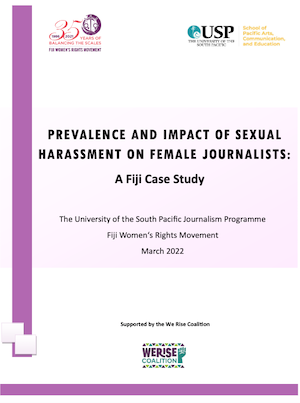
“I’m really blessed to have four women who are very strong. They understand the need to be diplomatic, but they also understand the need to get answers to the questions that need to be asked.
“They are kind of on their own, with a little bit of guidance from me. We worked out how to handle harassment, and how to get the answers. They have kind of done it on their own.”
While asking the tough questions may be a daunting exercise, it is imperative if Fiji is to avoid making the same mistakes, Chaudhary explains.
“I think for me now, it’s just about sharing what happened in the past, and getting them to understand that if we don’t ask the right questions now, we could have a situation similar to that of the last 16 years.
“This could happen if we don’t hold the current government to account, and don’t ask the hard questions now.”
Fiji’s proposal to end sexual harassment
A 2022 research report, ‘Prevalence and Impact of Sexual Harassment on Female Journalists’, revealed that more than 80 per cent of Fijian female journalists have experienced physical, verbal and online sexual harassment during the course of their work.
The report by The University of the South Pacific’s Journalism Programme and Fiji Women’s Rights Movement also proposes numerous solutions that prioritise the safety and wellbeing of female journalists.
Acknowledging the report’s good intentions, Chaudhary argues that it hasn’t created any substantial change due to long-standing Fijian culture and social norms.
“The report was, for many people, an eye opener. For me, it wasn’t,” he says.
“Unfortunately, I work alongside some people who hold the view that because they have been in the industry for some time, they can speak to females however they want.
“There wasn’t necessarily any physical harassment, but in Fiji, we have a lot of spoken sexual innuendo.
“We have a relationship among Fijians and the indigenous community where if I’m from a certain village, or part of the country and you are from another, we are allowed to engage in colourful conversation.
“It’s part of the tradition and culture. It’s just unfortunate that that culture and tradition has also found its way into workplaces, and the media industry. So that was often the excuse given in the newsroom.
Excuse that was used
“Many say, ‘I didn’t mean that. I said it because she’s from this village, and I’m from there, so I’m allowed to.’ The intent may have been deeper than that, but that was the excuse that was used,” he says.
Chaudhary believes that the report should have sparked palpable policy change in newsrooms.
“It should have translated into engagement with different heads of newsrooms to develop policies or regulations within the organisation, aimed at addressing those issues specifically. This would ensure that young women do not enter a workplace where that culture exists.
“So, we have a report, which is great, but it didn’t turn into anything tangible that would benefit organisations.
“This should have been taken on board by government and by the different organisations to develop those policies and systems in order to change the culture because the culture still exists,” he says.
Maxim Bock is a student journalist from the Queensland University of Technology who travelled to Fiji with the support of the Australian Government’s New Colombo Plan Mobility Programme. Published in partnership with QUT.


